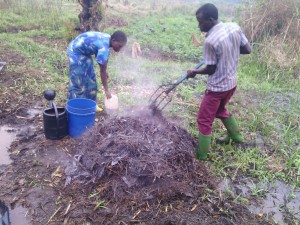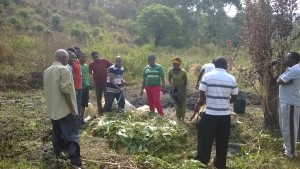Ngara, TZ – Compost Production Training – 29 July 2014
SODAT is embarking on a new project to empower the students, families, and schools they work with to become food self-reliant. The SODAT team is using the FAITH Garden model that Better Lives has helped implement with other partners in Tanzania, Cambodia, and the Philippines. The first stage of this project is compost production.
At the beginning of July, SODAT hosted Mary Andrea Shayo – project manager for the Lishe Bora Garden Shop – for a project introduction and 2-day compost production training. The SODAT team arranged meetings with the Regional Education Commissioner and District Agriculture Officer to build support for the project. Both offices were enthusiastic and the District Agriculture Officer even joined the 2-day training.
Mukibogoye Primary School was selected to pilot the program because the school is closest to water (only 1 km. away). The school selected two former students to lead the project and participate in the training. Sheffa and Teopista were selected for their spirits of volunteerism and good work-ethic. The training was also attended by school staff, faculty, and administration.
During the two day training 3 compost piles were made. Each pile should be sufficient for approximately one full-size garden, so the team has a great head start in their compost-production operation. After three weeks, the compost is decomposing according to schedule. The next phase of the project will be for Sheffa, Teopista, and Daudi – SODAT’s Assistant Coordinator – to learn the next steps of garden production and maintenance.

Teopista, right, and Sheffa flipping compost. The steam coming out of the compost means decomposition is happening. The heat generated by decomposition helps kills bad bacteria. After the first few weeks the piles won’t produce heat.
After the training, the District Agriculture Officer explained why he thought the project could be successful. “This project is not so different from what we already do,” he explained, “There are just a few new technologies and methods that can help people improve using the knowledge they already have.”
The biggest challenge the garden program will face in Ngara is water access. Currently, there is only one water access point in the village of Mukibogoye and most people have to walk a few kilometers to reach it. People in other communities must travel even farther. This is not a sustainable situation for garden production and maintenance. A government plan is in place to install mainline pipes running through the area, and this will be critical to the garden program’s success.


